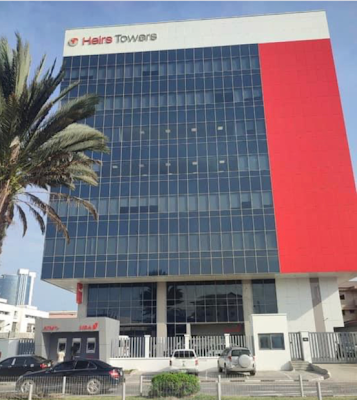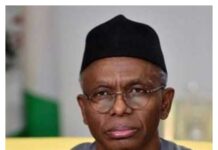The Lagos State Government has sealed the Tony Elumelu’s Heir Tower building located in Ikoyi for reasons that the structure, which houses Heirs Insurance and UBA Bank, is suspected to be exhibiting signs of structural failure.
The move was said to have been made by the government to avert any form of calamity as frantic efforts are being made to address the environmental pollution that is gradually drowning the serenity of Ikoyi and Victoria Island.
The state government is exhibiting no pretence about its resolve to nip in the bud any act of lawlessness with regard to the bourgeoning real estate business in the area.
There is no gainsaying the fact that the once serene pricey abode is giving way to the now boisterous noisy landscape largely occupied by the super-rich.
A Facebook user, Chukwudi Iwuchukwu who posted it on his page, “In a bid to avert a possible collapse and its attendant effects, officials of the Lagos State Building Control Agency (LASBCA) have sealed off a Seven-Floor structure located at 107B, Ajose Ogun Street, Victoria Island Lagos.
Nigerian billionaire businessman, Tony Elumelu, owns the Heir Tower building.
According to the General Manager of LASBCA, Arc. Gbolahan Owodunni Oki, the structure which houses Heirs Insurance and UBA Bank is suspected to be exhibiting signs of structural failure as preliminary investigations revealed that some floor tiles on the fourth floor have popped off along the expansion joints of the building.
He informed that an on-the-spot assessment of the building further revealed that in an attempt to cover up the suspected structural defects of the building, the developer of the tower, Afriland property, another company belonging to Tony Elumelu had already started renovation/remodelling works without carrying out proper tests to ascertain the cause of the defects, hence the evacuation and seal-off order on the building pending further investigation.
Whilst appreciating the whistleblower for calling the attention of the State Government to the condition of the building, Arc. Oki urged all developers/owners to always do the right thing at the appropriate time by adhering strictly to the building codes of the State”.
According to a source in government, “The government will not fold its arm and watch people behave recklessly without order and accountability. We are talking about people’s lives here. The state will no longer tolerate such attitude from anybody no matter how highly placed they may be,” the source said.
Building collapse has been a regular occurrence in Lagos State in the recent years. In 2016, about six (6) cases of fatal building collapses were recorded in state alone. Technocrats and analysts have at one time or the other blamed the high incidence on weak building process and/or poor physical development control.
Building collapse leaves on its trail with wastes of financial resources, in some cases, wastes of human life, waste of time invested in construction and clearing of debris on site after collapse, and waste of building materials. The reputation of the construction company is not spared either when it happens.
In the cases experienced over the years, it was found out that majority of building collapses were due to substandard building materials, bad design, wrong foundation, wrong site, bad usage of the structure, poor technology and inexperienced contractor. In most cases, the buildings do not have approved building plans from either the local government or state ministry of Land and Physical Planning.
Collapsed buildings are those that the qualities have been compromised either due to the materials used, faulty design in place or the ground on which the buildings were erected, were badly made-up. Some projects in Nigeria are planned to fail because the project owners or sponsors refused to employ competent project managers, engineers and builders.
It is a known fact that traditionally, projects start with the client who engages, in most cases, his architect to design the project. He then contracts a project manager to oversee the design and construction. For any project that is more than one floor, structural engineer must be engaged to design and supervise the structures.
















